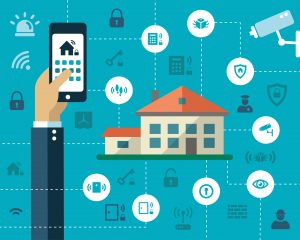A cross-country move inspired Karin Willison, who uses a wheelchair, to embrace smart home technology and she hasn’t looked back since. While the cutting-edge devices can come at a premium, the increase in independence and safety it has proved her has been truly life-changing.
 Curious to see what other technologies people with disabilities were using, Willison, as a writer for the Mighty, decided to ask the Mighty Facebook Community which smart home devices they use and recommend. Here is what they recommended.
Curious to see what other technologies people with disabilities were using, Willison, as a writer for the Mighty, decided to ask the Mighty Facebook Community which smart home devices they use and recommend. Here is what they recommended.
1. Amazon Echo
The Amazon Echo is an ideal starting point for any smart home setup. The Echo and its smaller companion Echo Dot allow you to control devices in your house using your voice. Of course, you can also download the Amazon Alexa app for your smart phone, and use it to control your devices when you’re not home.
A Mighty community member said the hands-free aspect of Alexa is particularly appealing. She uses it to “set timers, reminders, alarms, shopping lists and do Internet searches to avoid using [her] hands too much.”
2. Smart Lock
Do you need to give personal care attendants, nurses, therapists or a housekeeper access to your home? If so, a smart lock is a much safer option than a keypad. Keypad locks don’t tell you if, when or by whom they’ve been used, and it can be difficult to change the combination. The combination can easily be given away to someone with harmful intentions.
By contrast, a smart lock uses each user’s smartphone as a key. You can give users admin, guest, or temporary access, or even limit the days and times they can enter your home. The app keeps a log of who has entered your home and when, so you can confirm your kids or home health aide arrived on time. Don’t want someone coming over anymore? You can remove their access in seconds.

Click to watch Kim Eberhardt Muir, MS, talk about how assistive technology helps with daily life after SCI.
3. Smart Doorbell
If you spend a lot of time in bed due to a disability or chronic illness, or can’t see out your front windows from your wheelchair, a smart doorbell can help. Smart doorbells have a motion-sensor camera and will show you who’s at the door, so you can decide whether to answer or not.
4. Smart Thermostat
Have you ever woken up in the middle of the night feeling boiling hot or freezing cold, but getting out of bed would be physically impossible or painful? A smart thermostat can keep a home at the exact temperature, but if you happen to need to change it, you can do so from your phone anywhere, even when you’re out. Overall, it will give you increased control over the comfort of your environment, day and night.
5. Smart Lighting and Outlets
Smart lighting is one of the best tools for increasing access and visibility in your home. Gone are the days of having to remodel a house just to lower a light switch for access. One smart plug or light bulb can make even the most inaccessible fixture simple to use with a tap to your smartphone screen.
Smart light bulbs give you more options than just “on” and “off.” They’re dimmable, and some bulbs can even change colors. So if you need to dim lights to reduce sensory overload, or see more effectively in a certain color light, you now have options.
6. Smart Curtains, Shades and Blinds
Curtains and shades can be very difficult for people with mobility disabilities to operate. Smart window coverings solve this problem.
7. Garage Door Openers
It’s easy to lose garage door openers, and the buttons can be hard to press if you have limited hand strength. With a smart garage door opener, you can open your garage from anywhere. Be sure to check the brand of your existing garage door opener to choose a compatible smart add-on.
What is your favorite smartphone device? Please share below.
Leave a Reply